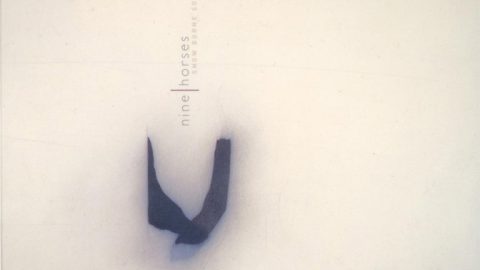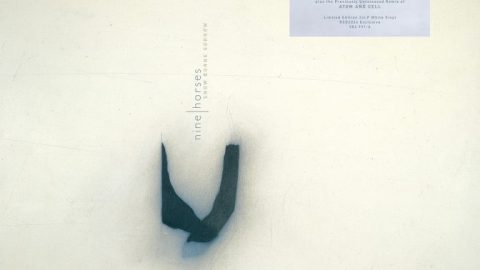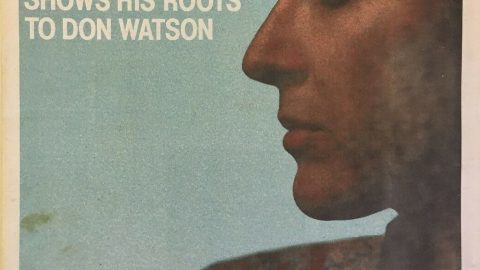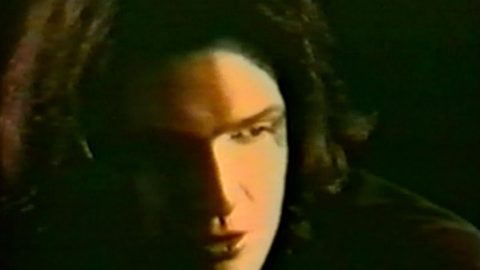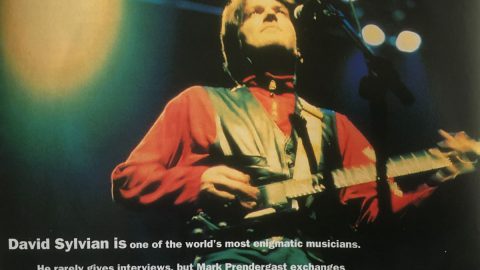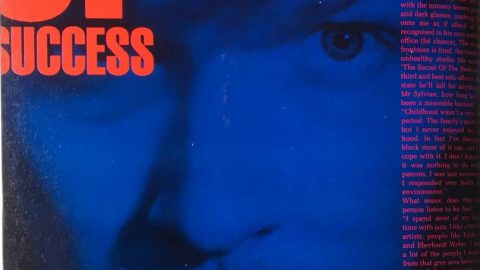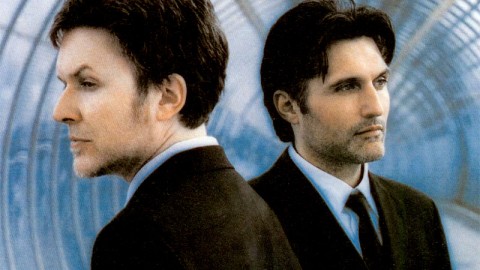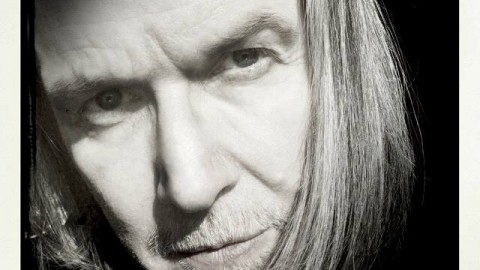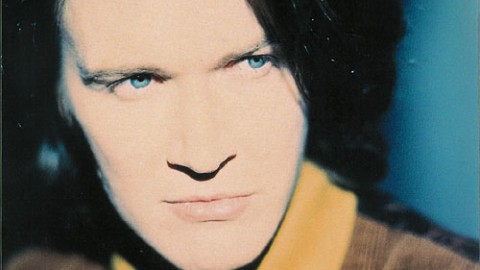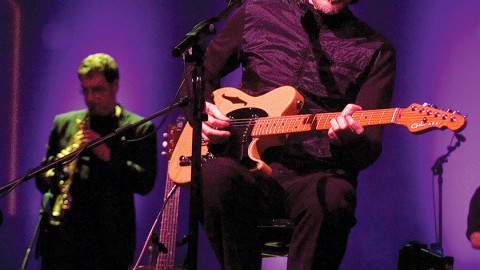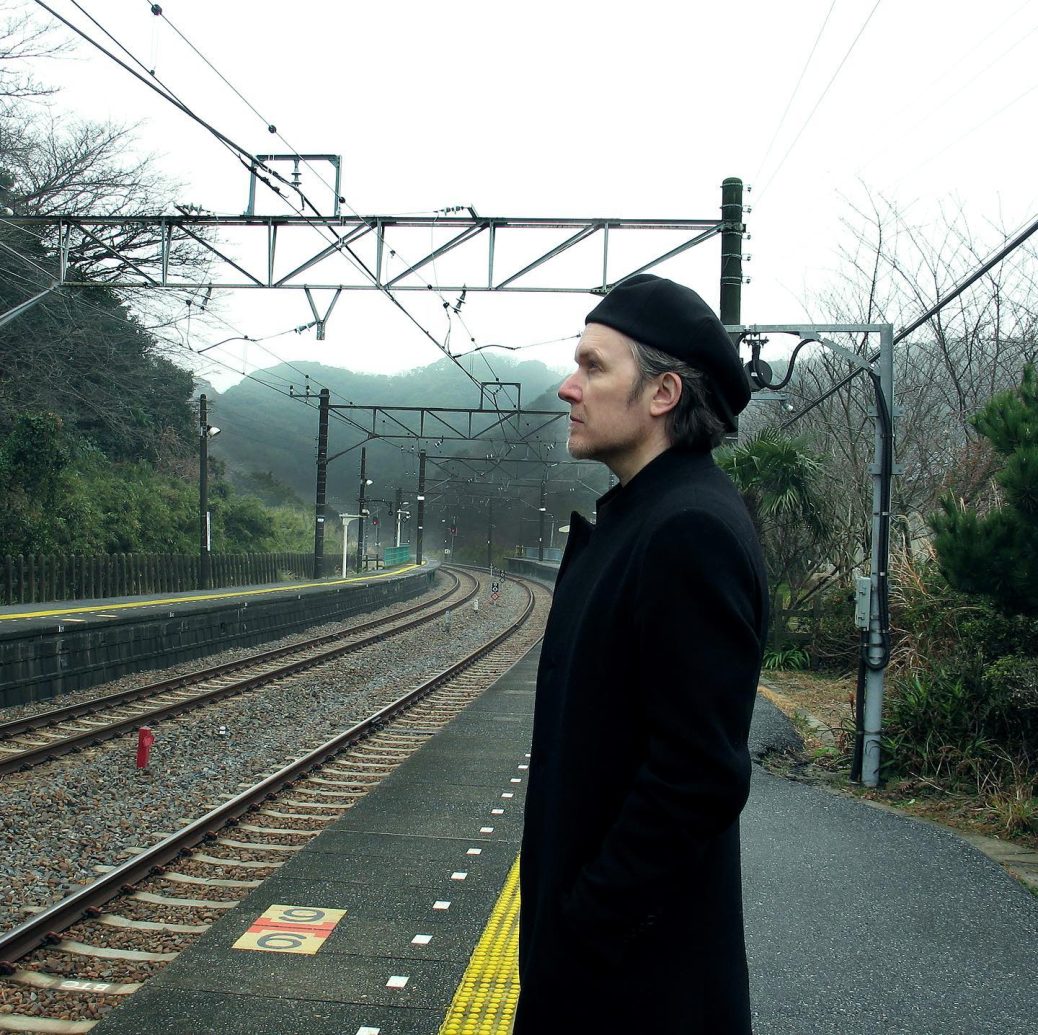
Interview (in Italian) originally published in the Italian KULT magazine (2005).
Online published on (now defunct) davidsylvian.it on April 21st, 2009 by ‘camphor’.
Translated and kindly provided by Marta Roia.
Listening to him speak, observing his measured and quiet gestures, it seems almost impossible that in the early eighties he has been the front man of a band such as Japan. At that time he was sporting a heavy make-up and his hair were dyed with an unrealistic blond, while the band was proposing a kind of avant-glam pop tinged with electronics.
Today David Sylvian, with short hair, faint beard and bright eyes that follow each of your movements, is a refined and kind gentleman in an elegant black suit, with a constantly moving musical path. He is in Italy to speak about Nine Horses, a new project which involves Steve Jansen and Burnt Friedman, and to which contributed trumpeter Arve Henriksen, singer Stina Nordenstam and Ryuichi Sakamoto too. The trio has just released Snow Borne Sorrow, a certainly interesting album, far from the slightly extreme experimentalism of Blemish and more in tune with the sound textures of works such as Brilliant Trees or Dead Bees On A Cake. The encounter with David Sylvian offered us not only the occasion to delve into musical current news, but also to take stock of his more than twenty year career.
Let’s begin from your distant past. In early 80s with Japan you reached commercial success and fame. Once the group disbanded you started your solo career based on search and far from pop glamour. Was it a difficult choice?
Not at all. There are moments in life where you exactly know which is your next step. Perhaps you do not completely understand the reasons but you know that you have to make some choices. You simply have no alternative. At a certain point, my music wasn’t matching anymore with the band’s one, so the only thing to do was to ackowledge that that experience was over. At the time I was utterly confused: I wasn’t afraid of giving up easy and safe money, I just wanted to understand which direction my music would have taken. I didn’t know it yet. The fact is that from Brilliant Trees on I started a quest path.
But today, in your opinion, is it still possible to compose avantgarde music?
Today certainly more than in the past. It’s true that the commercial music industry is more and more intrusive and increasingly poorer, however threre are wide and common areas where musicians using technology are experimenting new musical languages.
Let’s now speak about your new album, Snow Borne Sorrow, made with Nine Horses, a trio composed by you, your brother Steve Jansen and German musician Burnt Friedman.
It’s a work that had a complex and long development. I started composing it about four years ago with Steve in a studio full of advanced technological instruments. While I was busy in these sessions, I felt the urgency to record an album alone and in six weeks I composed Blemish. When I finished this work I was so excited that it has been impossible for me to resume Snow Borne Sorrow composition, even though I knew that some of the recordings were really interesting. So I started to tour Blemish and during a gig in Germany I met Burnt Friedman, whose work I really enjoyed. We then decided to do something together and from our collaboration eight songs were born, but for me the final result was quite disappointing. So I asked Burnt to make some changes and he agreed. Listening to the tapes, I realised that they perfectly matched wth the work done with Steve. So by combining those two different projects, appropriately revisited, I was able to make a consistent and hopefully interesting choral album.
Snow Borne Sorrow starts with a piece called Wonderful World… Do you really believe that nowadays the world is actually wonderful or are you ironic?
Not at all. In fact I believe that, notwithstanding the troubled period we are living in, it’s possible to see reality with different eyes. I find that beauty and sacread are everywhere, you just have to be able to see them and this mainly depends on the gaze perspective. I’m sure that beauty inhabits our world, beyond our capacity of enjoying it.
One of the album’s guests is Ryuichi Sakamoto, who plays in the just mentioned track and with whom you’ve collaborated since many years. With him you composed World Citizen, a song that ponders on September 11 tragedy.
Yes, it’s true, even though the piece that better expressses my feelings on that event and my attitude towards the American way of life is Atom and Cell from Snow Borne Sorrow.
Can you tell me about it?
It’s the first track I wrote after the Twins collapsed. On the 10th of September 2001 I was in New York with my family. I remember that in the afternoon there was a very strange light, a really sinister one, and that my wife turned to tell me: “There’s an incredible feeling, it seems that something awful is going to happen.” Then towards the evening it started to pour down. We were on the Fifth Avenue and in that moment an encounter offered me the spark to write Atom and Cell.
Who did you meet?
A soaked homeless person that looked like she was on her last legs. She was wrapped in garbage bags and when I saw her I looked for Ingrid [Ingrid Chavez, Sylvian’s partner] who was away from me at that moment; when we recovened, I said: “Look, there’s a woman we absolutely must help.” She was gone when we returned. I’d obviously already seen homeless people in New York, many times, but this one striked me in a way I can’t explain. It was some sort of vision, an emblematic image of my relationship with America.
And what’s your relationship with America then?
Very conflicting, especially in this period, under this Administration. It’s a long time since in the States the problem of the other has being removed, people are no longer interested in understanding their fellow men, and walls are being erected among persons. The concept of otherness, diversity went to hell. And “The Banality of Evil”, a track of the album, speaks exactly about this.
“Tell me what we need, write a list or something, we don’t need to need a thing”. These words too, written in the lyrics of Late Night Shopping, a track in Blemish, seems to describe another key aspect in the American way of life, the one in relation to frenetic consumption. Am I wrong?
No, the song speaks exactly about that. In America shopping is a constant, almost automatic activity, you do it even if there’s nothing you need. I find materialism in the States, its form of capitalism, very worrying. Any ethical or moral value is subordinated to the economy. After the Twins tragedy, the imperative was: go out, buy, go to restaurants, keep the economy running. Then, when Saddam Hussein was captured, main networks have immediately pointed out how that event would have positively affected the Stock Exchange, the financial state of the Country. I ask myself where the human element has gone in this kind of system… shocking…!
Sorry but considering your thoughts about the States, I naturally ask you why you decided to go and live there…
For sure it wasn’t in my plans! I did it because Ingrid is from Minneapolis, my children were born there…
But there should be some positive aspects that allow you to keep on living there…
Americans are very optimistc, they aren’t cynical like us Europeans… Furthermore, after having spent some years in Minneapolis, I now live in North California, a place full of groups that work on spirituality, opposing widespread materialism. I spent time with them too, digging a lot in my inner life. Here, I have to say that America actually offered me this opportunity: if I had stayed in England, I don’t think I would ever have done such a thing. Furthermore, United States, in terms of landscape, are an amazing place, I have been all over the place for three or four times, and at times what you see takes your breath away… It’s their lifestyle that I can’t stand… From the social dimension to the most intimate and private one.
There’s a track on your new record, A History Of Holes, where you sing: “When I was a boy I saw through their lies, I swore I wouldn’t become the thing I despised, but events over take you while you set your sights on bigger game, on greater heights”. It seems a reflection on becoming an adult, on the abandonment of the typical ideals of youth…
The subject is exactly what you described. Becoming an adult means to come to terms with reality, not seeing things as extreme as you see them when you are young. It’s important to be able to grasp the nuances of existence and not just black or white… But growing up also means to start to deal with your own experience. And so it happens that everyone makes a picture of his own life in which, at least apparently, all the elements harmonize. But inside this picture there are also holes that represent those moments, those events that do not match with the depiction, and for this reason they relativize that fullness of meaning that we would like to attribute to our journey. The track conveys a questions: “As human beings, do we have to become aware of these holes, of these discordant elements, taking the risk of making our existential journey a difficult one, or is it better to get by and act as if nothing has ever happened?”. It’s a questions that fascinates me and to which I can not give a certain answer.
Yours is an art music, in which it seems to converge influences from the most different artistic and cultural expressions…
In fact there is no art or cultural form that doesn’t make an impact on me. But I’m an intuitive artist, I rely on instinct. In this way any possible influence remains outside the recording studio.
The track A Fire In The Forest (from Blemish) ends with these words: “There is always sunshine far above the grey sky. I know that I will find it, yes I will try…”. It would seem an optimistic statemet.. Do you consider yourself like that?
[Laughs] Once I was. Now, more and more often, threatening dark clouds are swirling over me!
Scans kindly supplied by Kitaj
Image copyright David Sylvian (published on Twitter or Facebook in 2022)

